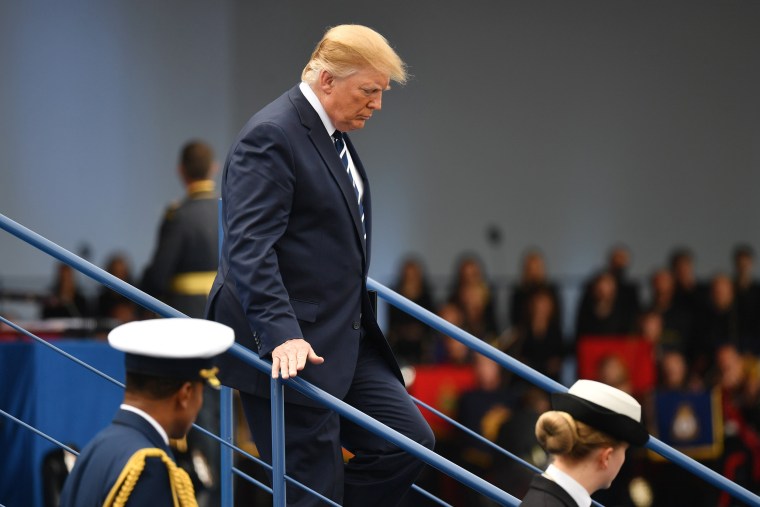President Donald Trump on Wednesday defended his administration’s controversial transgender military policy — which critics say is essentially a “don’t ask, don’t tell” policy for trans service members — by making an erroneous claim about drug use in the armed services on a British television talk show.
“They take massive amounts of drugs, they have to — and, also you’re not allowed to take drugs in the military, and they have to after the operation,” Trump said of trans service members on ITV’s “Good Morning Britain” on Wednesday.
In fact, the military does not prohibit service members from using prescription drugs — including hormones. The Navy changed its policy as recently as last year to allow pilots to maintain their flight status while undergoing mental health treatment with psychotropic drugs.
When the show’s co-host Piers Morgan pointed out that the military spends more money on Viagra for service members then it does on transgender health care — The Military Times reported in 2017 the Defense Department spent $84.2 million on erectile dysfunction medications, compared with $8 million for transgender personnel — Trump maintained that the costs were too high.
“And also, people were going in and asking for the operation. The operation is $200,000, $250,000,” Trump said. “And getting the operation, the recovery period is long, and they have to take large amounts of drugs after that.”
LGBTQ advocates and a number of medical experts have said that Trump is overstating the medical and economic costs associated with transgender health care as a way to justify what they see as a “ban” on trans service members, though the administration has maintained the policy is not a ban.
"The interview showed the president's lack of understanding regarding transgender service members, and he shared misinformation regarding the medical care they need and the cost of that care,” Blake Dremann, a transgender Navy officer and the president of the LGBTQ military group SPART*A, wrote in an email.
Dr. Jennifer Conti, an ob/gyn physician who works with transgender veterans, said Trump inflated the financial cost of transgender health care to “pander to his base.”
“For him, it’s never been an issue of financial expenses, nor is it an issue of drug use,” Conti said.
According to a 2017 estimate by the Palm Center, a think tank that researches LGBTQ military policies, the cost of replacing transgender troops could be as high as $960 million.
She pointed out that cisgender (nontransgender) individuals, in particular cisgender women, sometimes take hormones — many forms of birth control, for example, contain estrogen and progestin — and that not all transgender people take hormones.
“For transgender military members who do take this medicine, it doesn’t impair their ability to serve. … The misinformation further marginalizes transgender health care,” she said.
A 2016 study from RAND Corporation shows that “only a subset” — an estimated 29 to 129 transgender service members in active combat — would seek transition-related care each year. Using public health insurance claims data to estimate the cost of extending transition-related coverage to transgender military personnel, researchers found that the financial costs would increase only marginally.
Conti added that transgender health care is essential and the psychological costs of not receiving medically necessary treatment are dire.
“Not getting the correct medical care can have significant psychological consequences. People shouldn’t be forced to live in the wrong body,” she said. “I’ve walked people through the process of gender confirmation surgery, and they come out the other side with a look of universal joy.”
Under the Trump administration's trans military policy, which went into effect in April, anyone with gender dysphoria who is taking hormones or has already undergone a gender transition will not be allowed to enlist. In addition, currently serving troops who are newly diagnosed with gender dysphoria will have to serve in their sex as assigned at birth and will be barred from taking hormones or getting gender-affirming surgery.
However, those who received a diagnosis of gender dysphoria prior to the policy taking effect in April will be permitted to continue to serve in their preferred gender, receive hormone treatments and undergo gender-affirming surgery.
Shannon Minter, the legal director for the National Center for Lesbian Rights — which, along with GLBTQ Legal Advocates & Defenders, or GLAD, is suing the Trump administration over its trans military policy — said the "cost of barring transgender people from military service is high, weakens the military, and undermines our national security."
"Banning transgender troops drains financial resources due to the cost of replacing transgender personnel and excludes otherwise qualified recruits, which requires the military to spend more money on recruitment at a time when every branch is already struggling to meet its enlistment goals," Minter said in a statement shared with NBC News.
While Blake Dremann vehemently disagrees with Trump's trans military policy, he said he and Trump are in "complete agreement" on one point.
“Trump concluded that there are standards, and service members must meet those standards,” Dremann said. "Transgender members of the military serving around the world do just that: meet the standard and accomplish the mission."



